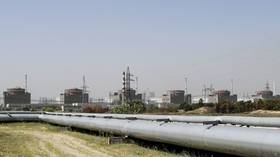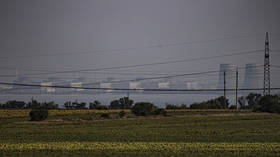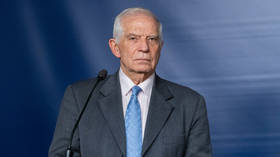Ukraine bombs nuclear plant, resulting in power cuts – reports

Artillery of the Ukrainian armed forces attacked the area of Energodar and the Zaporozhye nuclear power plant more than a dozen times over the past day, the Russian Defense Ministry said on Wednesday.
Three rounds struck inside the NPP, causing damage but no radiation leaks so far. The shelling happened after the International Atomic Energy Agency (IAEA) visited the facility and issued a report calling for the shelling to stop.
“Regardless of the presence of IAEA representatives, the Kiev regime continues its provocations at the Zaporozhye nuclear power plant, with the goal of creating the threat of a man-made disaster,” the defense ministry in Moscow said, noting that 15 artillery attacks against the city of Energodar and the territory of the ZNPP have been observed over the past 24 hours.
Zaporozhye is Europe’s largest nuclear power plant. Along with the nearby city of Energodar, it has been under Russian control since March. Artillery, drone, and rocket attacks began in July, however, damaging cooling systems, power lines, and other facilities.
Ukraine has accused Russia of staging false-flag attacks on the plant, but last week admitted its forces have shelled Energodar.
Of the 20 rounds fired by Ukrainian artillery from Marganets, due north of Energodar, three struck the nuclear power plant in the areas of reactors one and two, the Russian Defense Ministry said on Wednesday. The shelling reportedly interrupted power supply to Energodar.
“Any military activity – such as shelling – within, or in the vicinity of, a nuclear facility has the potential to cause an unacceptable radiological consequence,” the IAEA said in its report on Tuesday.
Shelling should be “stopped immediately to avoid any further damages to the plant and associated facilities,” the UN nuclear watchdog demanded, proposing the creation of a “safety zone” around the ZNPP as the way to do this.
Russia has rejected the idea of withdrawing troops that provide security for the NPP, saying that Ukraine would use this to seize the facility – as it tried to do during the IAEA visit last week, led by the agency’s Director General Rafael Grossi personally.
Grossi has told CNN he wasn’t calling for “demilitarization” but something “more modest.” Moscow’s envoy to the UN bodies in Vienna, Mikhail Ulyanov, told reporters he would ask the IAEA head to elaborate on the idea when they meet later this week.













